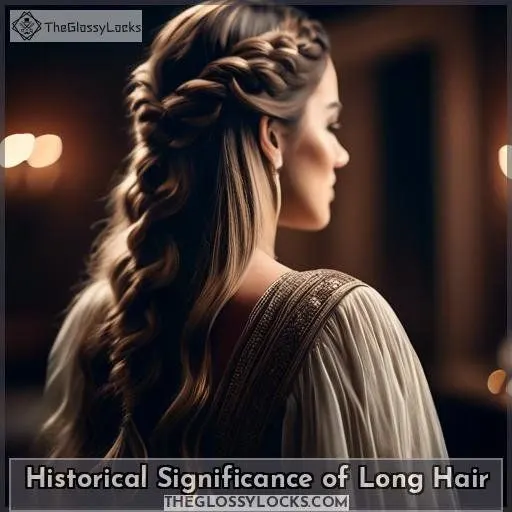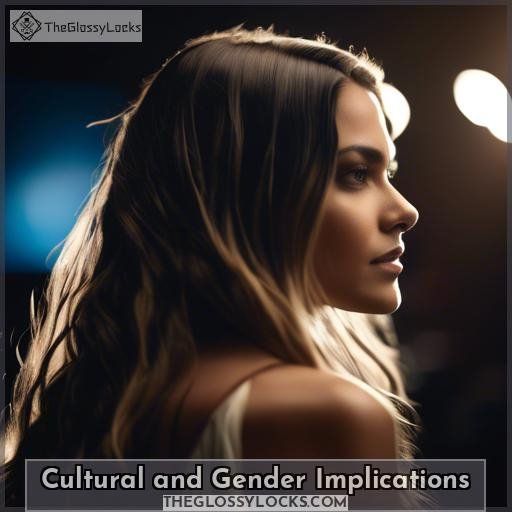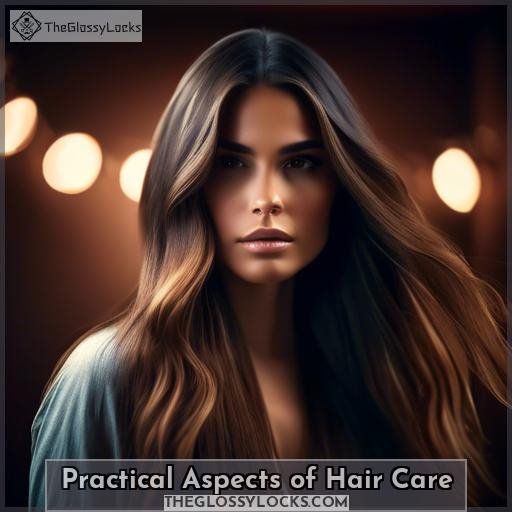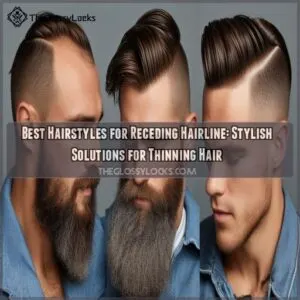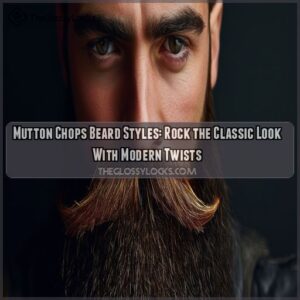This site is supported by our readers. We may earn a commission, at no cost to you, if you purchase through links.

You’ll find women have long hair for a mix of cultural, historical, and personal reasons.
Traditionally, long hair symbolized beauty and status for women in ancient Greek and Roman cultures. It’s also been associated with femininity and religious contexts like St. Paul’s letter linking long hair to a woman’s glory.
Socio-economic factors impact hair maintenance abilities too.
Aesthetically, long hair is perceived as youthful, though short styles emerged as women gained independence.
Personal preferences matter, whether prioritizing low-maintenance or embracing long hair’s symbolism.
Clearly, the motivations behind a woman’s hairstyle choice merit further exploration.
Table Of Contents
Key Takeaways
- Long hair has been associated with beauty, status, and femininity in ancient Greek and Roman cultures, as well as religious contexts like St. Paul’s letter linking long hair to a woman’s glory.
- Socioeconomic factors also influence hair maintenance abilities, with long hair often serving as a status symbol that requires resources to maintain.
- Personal preferences play a significant role in hair length choices, with some women prioritizing low-maintenance styles while others embrace long hair’s symbolism.
- Long hair can be challenging to maintain, requiring significant time and effort for proper care, but many women choose to wear their hair long for cultural, historical, and personal reasons.
Why Do Women Have Long Hair?
Women have long hair for various reasons, including cultural, historical, and personal factors. In ancient Greek and Roman cultures, long hair was associated with power and wealth, and aristocratic royal families, both men and women, had long hair. Long hair can also symbolize fertility and youth, which are attractive qualities to men. Additionally, long hair can be a sign of good hygiene and health, and it can protect women from cold weather. Some women also prefer long hair because it allows them to experiment with different hairstyles and looks. Overall, the reasons for women having long hair are complex and multifaceted, reflecting the diverse and evolving nature of human culture and preferences.
Historical Significance of Long Hair
You’re right to note the ancient Greek and Roman influences on associating long hair with women.
In those societies, women were expected to wear their hair long, while men kept shorter styles.
This reflected cultural views that linked femininity to long tresses.
Religious teachings like St. Paul’s letter to the Corinthians reinforced this gender divide.
It declared long hair a glory for women but shameful for men.
Ancient Greek and Roman Influences
In ancient Greek and Roman societies, long hair was a symbol of beauty and status. Women often wore their hair long and parted it down the center, while men typically had shorter hair. This preference for long hair was influenced by cultural norms and beauty standards of the time.
Roman women, in particular, were known for their elaborate hairstyles, which often required the help of slave hairdressers. These hairstyles were a sign of wealth and status, as they required time, resources, and skill to maintain. In contrast, simpler hairstyles were considered more suitable for lower-class women or those of less means.
Religious perspectives also played a role in the significance of long hair. In the Bible, St. Paul’s letter to the Corinthians states that long hair is a shame for men but a glory for women. This passage reflects the belief that long hair was a feminine attribute and a sign of modesty and virtue.
In modern times, long hair has continued to be associated with women, although societal norms and personal preferences have led to changes in hair length and styles. Short hairstyles like the bob became popular in the 20th century as women gained more independence and sought practical hairstyles that required less maintenance.
Despite these changes, long hair remains a symbol of femininity and beauty for many women, and can also serve as a personal expression of identity and individuality.
Religious Perspectives on Hair Length
In ancient cultures, long hair was often associated with women, while men typically had shorter hair. This was influenced by religious beliefs and societal norms. For example, in the Roman Empire, women kept their hair long and parted it down the center, while men had shorter hair. In ancient Sparta, men wore their hair long, while married women cut theirs short.
Religious perspectives also played a significant role in shaping hair length in different cultures. In the Bible, St. Paul’s letter to the Corinthians stated that long hair was a shame for men but a glory for women. In some Eastern Christian cultures, it was expected for both men and women to wear long hair, particularly among clergy and monks.
These cultural taboos and religious perspectives have influenced why women have traditionally had longer hair than men. However, it’s essential to remember that individual preferences and personal circumstances can also impact hair length choices. In modern times, short hairstyles like the bob became popular as women became more independent, and long hair isn’t a universal norm for all women.
Health and Status Indicators
Long hair has traditionally been viewed as an indicator of good health and well-being, as it requires adequate nutrition, rest, and physical robustness to maintain. Additionally, the resources and time needed to style and care for long hair often signify a higher socioeconomic status, making it a status symbol in many societies.
Long Hair as a Sign of Well-being
Long hair is often associated with health and well-being.
It can be a sign that a person is taking care of their nutritional needs, engaging in physical activity, and aging gracefully.
To maintain long hair, individuals need to make sure they have good nutrition, rest, and exercise, which are all indicators of overall health.
In some cultures, long hair is seen as a status symbol, especially when it requires assistance to style, implying that the person has the wealth and resources to afford such care.
However, long hair can also be a burden in certain situations and may require more time and resources to maintain than shorter styles.
Hair Maintenance and Socio-economic Status
Hair maintenance and socio-economic status are intertwined, with long hair often serving as a status symbol. Here are four key points to keep in mind:
- Social status: Long hair can signal wealth or high status, as it requires resources to maintain.
- Economic disparities: Access to hair care products and services can be affected by income.
- Class indicators: Hairstyles can reflect class differences, with more elaborate styles often associated with higher social classes.
- Cultural norms: Different cultures may have varying expectations for hair length and maintenance, reflecting societal values.
Cultural and Gender Implications
In some cultures, hair has legal significance, with specific laws governing hairstyles and lengths. Long hair has been traditionally associated with women, while men with long locks were often scorned as effeminate, reinforcing gender roles and identities. However, this perception has evolved, with men in certain cultures wearing long hair as a symbol of power or status.
Hair in Legal and Moral Contexts
Shifting from the health and status indicators of long hair, let’s delve into the intricate web of hair in legal and moral contexts. You see, hair isn’t simply an adornment you wear perpetually; it’s a declaration, entangled in law, morality, religion, and status. It’s a silent whisper of who you’re and where you belong.
| Aspect | Influence | Example |
|---|---|---|
| Law | Hair can be a legal identifier, impacting everything from identification to courtroom prejudices. | Hair evidence in forensics |
| Morality | Societal norms frequently dictate hair’s moral standing, intertwining with personal convictions. | A cut above the rest implies moral superiority |
| Religion | Hair rituals and requirements speak volumes about religious adherence and identity. | Sikhism’s uncut hair symbolizes faith |
In this significant event, hair is more than keratin strands; it’s a complex narrative of identity, belief, and societal placement.
Long Hair and Gender Roles
Long hair has been a symbol of femininity for centuries, but it also carries cultural and personal significance. In many cultures, hair has legal and moral implications, and it can convey a person’s morality, sexual orientation, and socio-economic status. For women, long hair has been associated with youth, health, and fertility, while short hair has been seen as a sign of independence and practicality.
The psychological impact of long hair on men is different, as it can be associated with creativity, artistic expression, and nonconformity. However, men who grow their hair long may face social backlash and discrimination, as it deviates from traditional gender roles.
In some cultures, hair authenticity is essential, and natural hair is preferred over dyed or chemically treated hair. Maintaining long hair requires dedication and proper care, and it can be a tool for expressing masculinity, femininity, or even genderlessness.
Long hair can also be a burden in certain situations, and short hairstyles like the bob became popular in the 20th century as women became more independent. Despite these challenges, many women choose to wear their hair long as a personal preference or a symbol of their identity.
Practical Aspects of Hair Care
Long hair can be challenging to maintain, requiring significant time and effort for proper care. While short hairstyles offer greater practicality and convenience, long locks may necessitate assistance for complex styling and can prove burdensome in certain situations.
Challenges in Long Hair Upkeep
Long hair requires a significant time investment for maintenance.
Scalp fatigue, split ends, and hair tangles are common challenges.
The use of products like conditioners and oils can help, but excessive product consumption can lead to build-up.
Styling long hair often requires assistance, adding to the time and resource investment.
Despite these challenges, many women choose to wear their hair long due to cultural, historical, and personal reasons.
Short Hair and Practicality
Short hair offers several practical benefits, including low maintenance and easy styling. It also reduces the risk of breakage and saves time on hair care. By choosing short hair, you can enjoy a more relaxed approach to your beauty routine while still looking stylish and professional.
Personal Choices and Aesthetics
You may have noted that some women prefer to maintain their hair long for professional reasons, while others favor shorter styles.
Age can also impact perceptions of hair length, with long locks frequently associated with youth and vigor.
As we delve into personal choices and aesthetics surrounding hair length, it’s crucial to approach the topic impartially, considering both societal norms and individual preferences.
Professionalism and Long Hair
In the professional world, long hair has been a topic of debate.
Some argue that long hair is unprofessional. Others believe it can be part of a professional appearance.
Hillary Clinton’s long hair has been a subject of discussion. Some suggest it detracts from her authority.
Cultural norms and personal preference play a significant role in how long hair is perceived.
Age perception also comes into play. Some believe that long hair makes a woman look younger.
Ultimately, it’s about finding a balance between professionalism and personal style.
Age and Perception of Hair Length
Shifting from professionalism to the subtleties of age perception, it’s evident that hair speaks volumes.
- Age Perception: Long locks often defy conventional beauty standards, smudging the boundaries between youth and maturity.
- Hair Aging: As strands turn grey, they bear tales of wisdom, yet preserving length can signify unwavering confidence.
- Maturity and Length: Contrary to expectations, longer hair doesn’t diminish authority; it enhances it, displaying a combination of beauty and intelligence.
Frequently Asked Questions (FAQs)
How does hair length affect career prospects?
You can absolutely rock long locks and climb the career ladder – it’s about owning your style with confidence. Studies show biases fade when you exude professionalism. So flaunt those tresses, but make sure your skills truly dazzle.
What are the health risks associated with long hair?
Oh, you’ll just love this hair-raising tale! Long hair poses risks like headaches from tight styles, scalp issues due to product buildup, and potential hair tourniquet emergencies. But hey, don’t let that mane-iac reality get you in a tangle!
How does hair length affect personal relationships?
Your hair length can affect intimacy – longer locks may spark passion, while a short cut conveys independence. But true connection comes through open communication and mutual understanding, not hairstyles.
How does hair length impact self-esteem?
Like a lion’s mane, long hair can boost your self-esteem, making you feel confident and powerful. Scientific studies show it enhances perceived femininity and attractiveness.
What are the environmental factors that affect hair growth?
You’re impacted by diet, stress, medications, pollutants, and hormones – all of which can accelerate or hamper growth. But focus on reducing damage through gentle handling and protection.
Conclusion
Coincidentally, you’ve likely noticed the diverse array of hairstyles women sport, reflecting the multifaceted reasons why women have long hair. Ultimately, a woman’s choice stems from personal preferences influenced by cultural, historical, and socioeconomic factors. This exploration exposes the complexity behind the motivations for a hairstyle that’s both aesthetically appealing and symbolically significant for many women worldwide.

